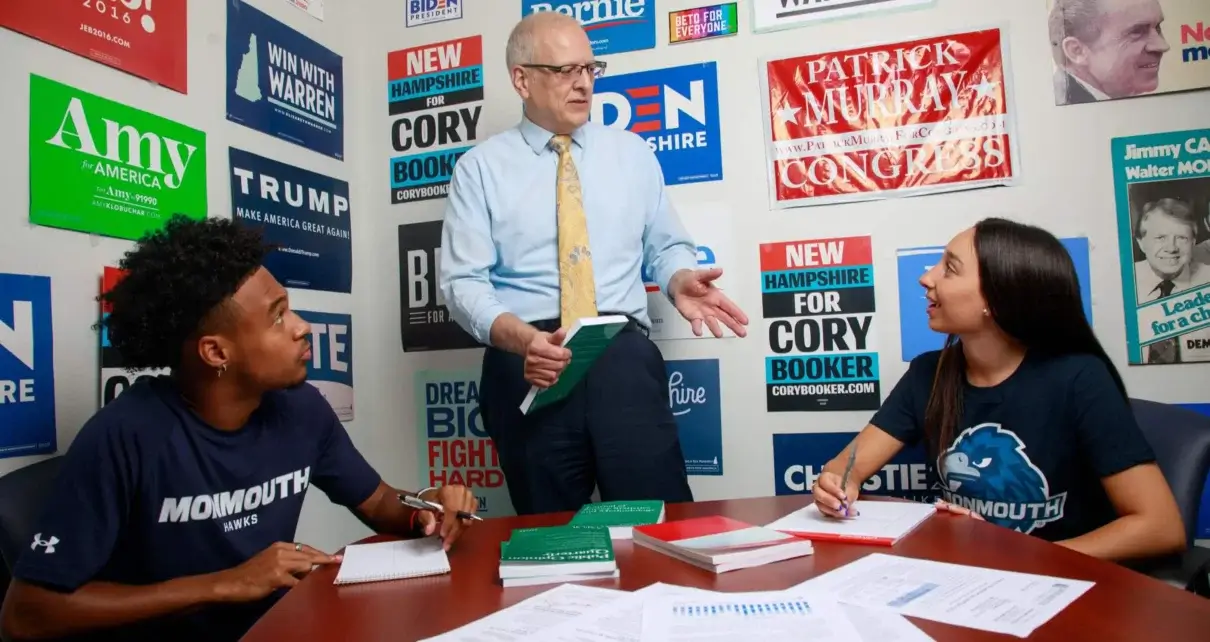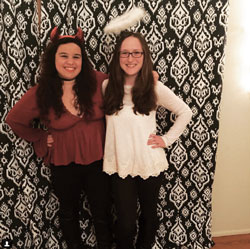In an email to faculty on March 12, President Patrick Leahy announced that the Monmouth University Polling Institute would be closing its doors this year on July 1.
The Institute was founded in 2005 by current Director Patrick Murray and employs three people. Its stated mission, according to the website, is to “Foster greater public accountability by ensuring that the public’s voice is heard in the policy discourse.” “The Outlook” reached out to Murray for a response, but never heard back.
In the email, Leahy explained that the decision came after dialogue with Monmouth’s Board of Trustees concerning the Institute. “This comprehensive review over the past year was to examine and evaluate each center of distinction relative to its impact on student engagement and outcomes,” he wrote, “as well as each one’s alignment with the institutional priorities and goals outlined in our current strategic plan.” The Polling Institute’s mission, according to Leahy, no longer aligns with the University’s strategic goals.
Christopher Maher, Chair for the Board of Trustees, corroborated Leahy’s statement, saying that the Board, in conjunction with Leahy, evaluated all of the University’s centers and institutes and their value to students, academic programs, and faculty. “As it relates to the Polling Institute,” Maher said, “We determined that the Polling Institute could not satisfactorily meet these criteria. Patrick Murray and his staff have served Monmouth well over the years, but the polling industry has experienced significant changes. Given our mission to enrich the student experience, support faculty, and exercise prudent financial discipline, the Board determined that the considerable annual resources required to operate the Polling Institute should be allocated elsewhere. This decision was difficult, but it is consistent with our strategy to make a first-class private education as accessible as possible.”
Despite the decision being made with the students’ and faculty’s welfare in mind, members of the faculty who have worked with the Polling Institute think differently. “The Polling Institute is one of the most prolific research teams on campus,” explained Jaime Myers, Ph.D., MPH, Associate Professor for the Department of Health and Physical Education. “They were consistently rated as a top-tier polling group for their use of best practices. Their findings put the Monmouth brand into the local and national media’s dialogue, providing free advertising and an academic anchor to the Monmouth brand in the popular press. Beyond that, the Polling Institute team is an invaluable resource for social scientists doing survey-based research.”
Myers continued, “Working with Patrick Murray and Tina Johnsen this past year as a Polling Institute Fellow rejuvenated my faculty scholarship, providing a wonderful sounding board and expert guidance in survey design. I am sad to see the dissolution of what I considered to be one of the scholarly pillars of Monmouth…I feel that closing the Polling Institute is a decision made in response to immediate financial and political headwinds rather than long-term strategic positioning.”
Leahy, however, maintains that the Institute’s closure is simply due to allocating University funds towards more student-centric initiatives. “The Polling Institute costs a lot of money each year, yet it doesn’t directly improve the student experience,” he said. “Our current strategic plan aims to make Monmouth a national leader at integrating excellence and access. I felt that those resources could be better spent in pursuit of that goal.”
Despite these statements, the Polling Institute provided students and faculty opportunities to engage with the establishment’s data and work closely with the employees and contributors behind the scenes. According to the Institute’s website, they collaborate with faculty and students alike, providing students the ability to work as research assistants.
Students were able to participate in the organization that contributed to Monmouth finding its place on the map. Abel Rymar, junior Political Science major, is a current intern at the Institute and credits the establishment for getting a professional look inside the political industry. “My internship has given me insights into how political offices typically operate. Having to look up different types of directors and staffers—such as the chief of staff, legislative director, and district director—has even gotten me into contact with other potential opportunities for gaining experience in politics. Most importantly, the Institute has given me so much support in finding similar forms of work or work-based learning opportunities,” Rymar said.
Because of the experience, Rymar does not believe that the Institute’s closing is justified. Rymar continued, “The explanation given by the President and Board is not sufficient for me. The Polling Institute, contrary to the thoughts of the administration, does directly impact students. The value of a Monmouth degree is made better because of the prestige and accuracy that MU Polling is known for. While cost is an understandable concern, the priority for the University should be on academic research rather than another building dedicated to Bruce Springsteen.”
“The closing of the Institute means a loss of a potential internship for future Monmouth students, a loss of intellectual research and public opinion polling, and most importantly, a loss of a career for multiple people who have kept it going for several years. Despite the sentiments that Monmouth students do not attribute much importance to the existence of the Polling Institute, its closing marks the beginning of an era of uncertainty for academic freedom, the priorities of the university administration, and the future of pollsters in general,” Rymar concluded.
Going forward, Leahy recommended that students who are interested in working with politics on campus explore other avenues offered by the University. “I recommend our first-rate Political Science Department, which produces some of the very best student outcomes on campus,” he said. “Of course, if students are interested in internships and jobs, I recommend the Career Development Center, which has incredible placement rates for graduates in their field of choice within 6 months of graduation.”
The Institute has also been used by faculty members to collect data on a local, state and national level. Classes with research-heavy coursework tend to utilize government grants and research contracts to perform their research and analytics.
Michael Richison, MFA, Associate Professor for the Department of Art and Design, worked with the Institute to create a series of animations that connected to the establishment’s voter data related to the presidential election. “Over the course of a year (2020), I created over 40 animated gifs using the Institute’s data for their Twitter feed,” Richison explained. “Patrick and Tina would give me data, and I would use After Effects to animate things like approval ratings and voter support among various demographics. One of the many disciplines of graphic design is information design and presentation, so it was a clearly good fit. I also did some illustration work. I used Adobe Illustrator to draw little presidential caricatures to put on top of the graphs. We ended up calling them ‘Prez Dispensers.’”
The Polling Institute allowed Monmouth to inform the public on multiple topics, including politics and information regarding Hurricane Sandy. Murray’s data was included in various media outlets, including CNN, MSNBC, and FOX News.
“First of all, I don’t think the Polling Institute creates much buzz surrounding Monmouth right now. I think our highest ever rankings, our new research designation, the 70 times our athletic teams played on television this year, the Bruce Springsteen Archives & Center for American Music, and more create much better buzz at Monmouth today,” said Leahy.
With the closing of the Institute, members of the Monmouth community recognized Murray and his team’s work over the years.
Richison continued, “The work Patrick did was very important, and I was very lucky to be a part of the Polling Institute’s visual presentation.”
“Patrick Murray has served Monmouth with distinction for nearly 20 years. He is one of America’s leading public opinion pollsters. I wish him nothing but success in the years ahead,” Leahy concluded.
Similarly to some students whom we spoke with for this story, who question the real reasons behind the shutdown of the Polling Institute, some faculty questioned the motivations of the President and the Board behind this decision.
A full-time faculty member who spoke to us under the condition of no attribution, and who has worked with the Institute, said, “One is forced to wonder if the issue of the cost of the Polling Institution has any relationship to the recent presidential election. The University seems to bask in the glow of the national media coverage, the Polling Institute generates over the years, and the funding has never seemed to be questioned. Yet, now that we seem to be in a time where the current administration receives bad news so poorly, which one future pools might produce, and considering this administration has no problem targeting institutions of higher education for retaliation, you can’t help but wonder if the cost issue is a bit of a red herring, and that the cost thats really in play is one regarding the universities image rather than finances. There certainly seems to be money for other things. I don’t know the answer, but I can’t help but wonder. Sadly, it is the world we live in.”



